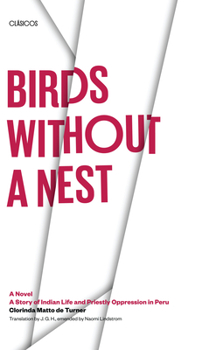Birds without a Nest: A Novel: A Story of Indian Life and Priestly Oppression in Peru
Select Format
Select Condition 
Book Overview
"I love the native race with a tender love, and so I have observed its customs closely, enchanted by their simplicity, and, as well, the abjection into which this race is plunged by small-town despots, who, while their names may change, never fail to live up to the epithet of tyrants. They are no other than, in general, the priests, governors, caciques, and mayors." So wrote Clorinda Matto de Turner in Aves sin nido, the first major Spanish American novel to protest the plight of native peoples.
First published in 1889, Birds without a Nest drew fiery protests for its unsparing expose of small town officials, judicial authorities, and priests who oppressed the native peoples of Peru. Matto de Turner was excommunicated by the Catholic Church and burned in effigy. Yet her novel was strongly influential; indeed, Peruvian President Andres Avelino Caceres credited it with stimulating him to pursue needed reforms.
In 1904, the novel was published in a bowdlerized English translation with a modified ending. This edition restores the original ending and the translator's omissions. It will be important reading for all students of the indigenous cultures of South America.
Related Subjects
Action & Adventure Classics Contemporary Criticism & Theory Education & Reference Fiction Foreign Language Fiction Foreign Language Study & Reference Genre Fiction History & Criticism Humanities Latin American Literary Literary Criticism & Collections Literature Literature & Fiction World Literature





